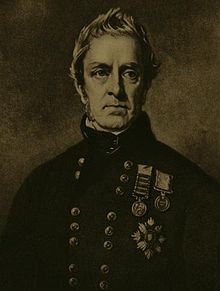George Pollock (General)
Sir George Pollock, 1st Baronet , GCB , GCSI , ( June 4, 1786 - October 6, 1872 ) was a British field marshal and led the second attack on Kabul in the First Anglo-Afghan War .
Life
George Pollock entered the Royal Military Academy at Woolwich on January 21, 1801 . After graduation, he joined the artillery of the Bombay Army in India . From 1814 to 1816 he took part in the Gurkha War in Nepal . In 1838 Pollock was appointed major general in Agra .
In response to General Elphinstone's defeat in withdrawing from Kabul in the First Anglo-Afghan War, Pollock was appointed commander of the troops in Peshawar . There he organized the troops demoralized by the defeat of Elphinstone and prepared a punitive expedition . As the first general in military history, he advanced over the Chaiber Pass to Afghanistan and on April 13, 1842 , horrified Jalalabad , where General Robert Henry Sale was from November 12, 1841 to April 7, 1842 during the siege of the same name with 2,000 men 6,000 Afghans held out. After the relief of Jalalabad, Pollock marched on Kabul, which he reached on September 15th. To punish the insurgents, he ordered the demolition of the citadel and the bazaar. During those two days Kabul was sacked by the troops.
In 1870 Pollock resigned from the British Army with the rank of Field Marshal . In 1871/72 he was constable of the Tower of London . On March 26, 1872, he was given the hereditary title of baronet , of the Khyber Pass. Pollock died that same year and was buried in Westminster Abbey . From his 1810 marriage to Frances Webbe Barclay had four sons and a daughter. His son Frederick Pollock (1815–1874) inherited his title of nobility, who in 1873 changed his family name to "Montagu-Pollock".
literature
- Saul David: The greatest failures in military history. From the battle in the Teutoburg Forest to Operation Desert Storm. 3. Edition. Paperback first edition. Heyne, Munich 2003, ISBN 3-453-86127-2 ( Heyne 19, Heyne-Sachbuch 833), (deals with the withdrawal from Kabul in 1842).
- Philip J. Haythornthwaite: The Colonial Wars Source Book. Caxton Editions, London 2000, ISBN 1-85409-436-X ( Source Books ).
- John Duncan, John Walton: Heroes for Victoria, 1837-1901. Queen Victoria's Fighting Forces. Spellmount, Speldhurst 1991, ISBN 0-946771-38-3 ( Military Pictorial Histories ).
- Charles Rathbone Low: The life and coresspondence of field-marshal Sir George Pollock . WH Allen and Co., London 1873. (Digitized: [1] )
Individual evidence
- ↑ Heroes for Victoria, 1837-1901: Queen Victoria's Fighting Forces , p. 34
- ^ The London Gazette : 23842, 1584 , March 22, 1872.
| personal data | |
|---|---|
| SURNAME | Pollock, George |
| ALTERNATIVE NAMES | Pollock, George, 1st Baronet |
| BRIEF DESCRIPTION | British Field Marshal |
| DATE OF BIRTH | June 4, 1786 |
| DATE OF DEATH | October 6, 1872 |

